 New America Foundation’s Lisa Margonelli makes a crucial point about the Gulf disaster in an elegant New York Times op-ed:
New America Foundation’s Lisa Margonelli makes a crucial point about the Gulf disaster in an elegant New York Times op-ed:
Moratoriums have a moral problem, though. All oil comes from someone’s backyard, and when we don’t reduce the amount of oil we consume, and refuse to drill at home, we end up getting people to drill for us in Kazakhstan, Angola and Nigeria — places without America’s strong environmental safeguards or the resources to enforce them.
For me, this analysis underlines the point Jonathan Hiskes made in a recent post: The Gulf calamity presents President Obama not just with an opportunity, but with a moral imperative, to ramp up a conservation program.
True, climate legislation has entered the rigor mortis stage — and it was flailing in a severely compromised state even before it collapsed. There isn’t likely much Obama can do to revive it at this point. But he could pledge to link a drilling moratorium to an all-out effort to conserve at least as much oil as we would have gained from offshore drilling.
Granted, if the U.S. were to implement a significant conservation program, oil prices would drop, and someone, somewhere else, would likely increase consumption, offsetting our efforts. But it’s also true that our intransigence viz climate legislation is helping scuttle any meaningful global climate accord. A serious conservation effort could break that stalemate — and spur a global rush to conserve oil.
How could Obama achieve such a thing? There are a variety of mechanisms, not all of which require congressional approval.
- He could add to his already-aggresive CAFE targets.
- He could perform an all-out blitz on behalf of mass transit. That idea is not as out-there as it might sound. When gas prices spiked in 2008, allegedly car-addicted Americans ditched their SUVs and flocked to trains and buses. The surge of passengers exposed the pathetic state of our public-transport infrastructure.
A 2009 survey conducted by the University of Chicago’s National Opinion Research Center showed a spike in public support for increased transit spending. “Mass transportation moved up three positions in the ranking of 22 spending priorities, and now is 10th place with a score of +40.8. This is an increase of 15.5 points from 2002,” the pollster stated. At 10th place, mass transit outdid support for highway and bridge funding, which finished 13th.
- He could mount a push to stop subsidizing sprawl and instead put resources behind the kind of dense, walkable cities where more and more people now want to live.
True, it would take a JFK-style man-on-the-moon push to achieve the kind of conservation necessary to offset drilling.
But now that one of our nation’s most prized and productive ecosytems has become severely imperiled by our appetite for oil — and the health of millions of citizens who live along the Gulf Coast has been imperiled too — the opportunity for such a push has been handed to Obama. If he doesn’t take it, we’ll continue lurching down the path to cataclysmic climate change — and the immediate depredations of producing our oil will only be pushed out of sight and out of mind.



